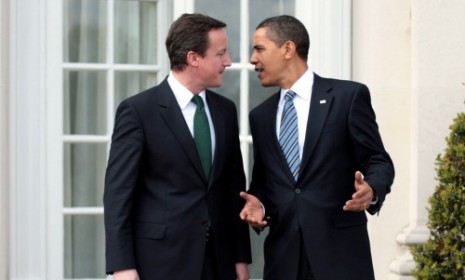Is Britain's new P.M. good for America?
As conservative David Cameron forms his new coalition government, Americans are naturally concerned about... American interests

Five long, agonizing days after its general election, Britain finally has a new Prime Minister. In the wake of Gordon Brown's resignation, David Cameron will form a coalition government between his center-right Conservative Party and the Liberal Democrats — prompting American observers to ask what this resolution might mean for the U.S. Historically, conservative prime ministers and U.S. presidents have often been simpatico (Margaret Thatcher and Ronald Reagan worked closely, for example). Pundits weigh in: (Watch David Cameron introduce "a new politics")
We may have lost a key military ally: Tony Blair's alliance with Bush over Iraq was so "deeply unpopular" in Britain, says Jackson Diehl in The Washington Post, that its new conservative leaders want to avoid "excessive deference" to the U.S. Could our largest military ally withhold its support if we end up in a new war — with Iran, most likely? "Let's hope we don't have to find out."
"What will Britain's govenrment do about 'slavish' relations with U.S.?"
The Week
Escape your echo chamber. Get the facts behind the news, plus analysis from multiple perspectives.

Sign up for The Week's Free Newsletters
From our morning news briefing to a weekly Good News Newsletter, get the best of The Week delivered directly to your inbox.
From our morning news briefing to a weekly Good News Newsletter, get the best of The Week delivered directly to your inbox.
This could offer a united front against Europe: Politically, Cameron's Tories "aren't really so different from Obama's Democrats," says Michael Tomasky in the Guardian. Obama is reportedly fed up with European leaders "complaining about the U.S.," and he and Cameron could find common ground "waging war (metaphorical, cultural and economic)" on Europe. If nothing else, it would be better than the last war we fought together.
There won't be any "special" relationship: The Thatcher-Reagan days are long gone, says Mark Blyth, professor of political economy at Brown University, as quoted by the AP, and Obama is now more focused on the BRICs — "emerging economies Brazil, Russia, India and China" — than he is on the Brits. "The game has moved on," and what David Cameron will soon discover is "Obama doesn't seem to have a special relationship with anyone."
"Will the Obama-Cameron relationship be special?"
A free daily email with the biggest news stories of the day – and the best features from TheWeek.com
-
 Syria’s Kurds: abandoned by their US ally
Syria’s Kurds: abandoned by their US allyTalking Point Ahmed al-Sharaa’s lightning offensive against Syrian Kurdistan belies his promise to respect the country’s ethnic minorities
-
 The ‘mad king’: has Trump finally lost it?
The ‘mad king’: has Trump finally lost it?Talking Point Rambling speeches, wind turbine obsession, and an ‘unhinged’ letter to Norway’s prime minister have caused concern whether the rest of his term is ‘sustainable’
-
 5 highly hypocritical cartoons about the Second Amendment
5 highly hypocritical cartoons about the Second AmendmentCartoons Artists take on Kyle Rittenhouse, the blame game, and more
-
 The billionaires’ wealth tax: a catastrophe for California?
The billionaires’ wealth tax: a catastrophe for California?Talking Point Peter Thiel and Larry Page preparing to change state residency
-
 Bari Weiss’ ‘60 Minutes’ scandal is about more than one report
Bari Weiss’ ‘60 Minutes’ scandal is about more than one reportIN THE SPOTLIGHT By blocking an approved segment on a controversial prison holding US deportees in El Salvador, the editor-in-chief of CBS News has become the main story
-
 Has Zohran Mamdani shown the Democrats how to win again?
Has Zohran Mamdani shown the Democrats how to win again?Today’s Big Question New York City mayoral election touted as victory for left-wing populists but moderate centrist wins elsewhere present more complex path for Democratic Party
-
 Millions turn out for anti-Trump ‘No Kings’ rallies
Millions turn out for anti-Trump ‘No Kings’ ralliesSpeed Read An estimated 7 million people participated, 2 million more than at the first ‘No Kings’ protest in June
-
 Ghislaine Maxwell: angling for a Trump pardon
Ghislaine Maxwell: angling for a Trump pardonTalking Point Convicted sex trafficker's testimony could shed new light on president's links to Jeffrey Epstein
-
 The last words and final moments of 40 presidents
The last words and final moments of 40 presidentsThe Explainer Some are eloquent quotes worthy of the holders of the highest office in the nation, and others... aren't
-
 The JFK files: the truth at last?
The JFK files: the truth at last?In The Spotlight More than 64,000 previously classified documents relating the 1963 assassination of John F. Kennedy have been released by the Trump administration
-
 'Seriously, not literally': how should the world take Donald Trump?
'Seriously, not literally': how should the world take Donald Trump?Today's big question White House rhetoric and reality look likely to become increasingly blurred